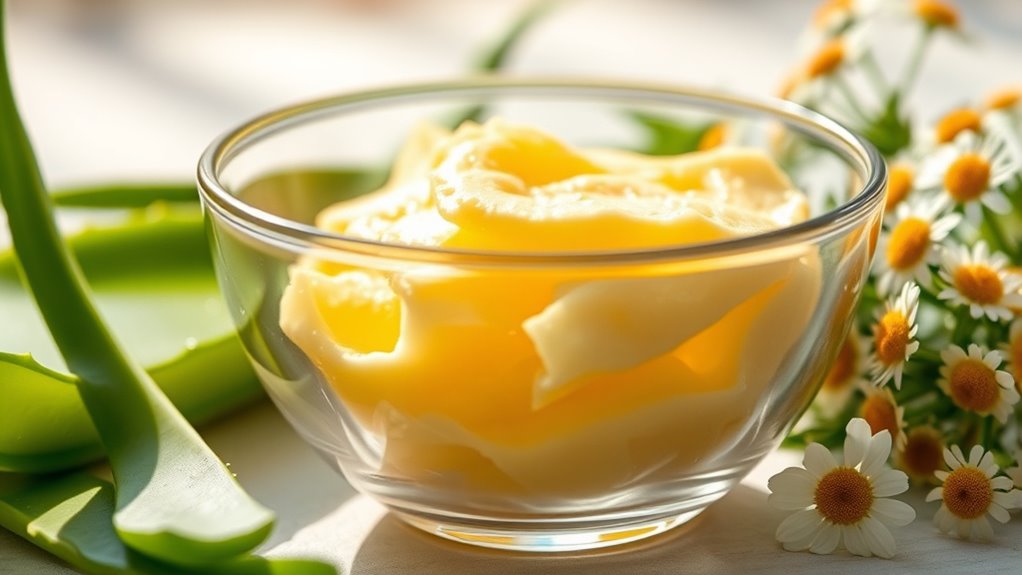Plant-based emollients like oils and butters are gentle, natural ways to nourish your baby’s skin. Oils such as coconut, almond, and jojoba help lock in moisture and quickly absorb without leaving a greasy feeling. Butters like shea and cocoa create a protective barrier, soothing and nourishing delicate skin. These natural ingredients reduce irritation and support skin health. If you keep exploring, you’ll discover how to choose the best options for your little one’s care.
Key Takeaways
- Plant-based emollients like oils and butters naturally moisturize and soothe baby skin without harsh chemicals.
- Common plant oils such as coconut, almond, and jojoba mimic skin’s natural barrier, providing quick absorption and hydration.
- Butters like shea and cocoa create a protective layer, nourishing and shielding delicate skin from environmental stressors.
- Natural emollients are hypoallergenic, reducing the risk of allergic reactions and irritation in sensitive baby skin.
- These ingredients support skin health, maintain moisture, and are suitable for daily use in gentle, eco-friendly skincare.

When caring for your baby’s delicate skin, choosing gentle, natural products can make a significant difference. Plant-based emollients, like oils and butters, are excellent options because they provide natural moisturizing properties that help keep your baby’s skin soft, hydrated, and healthy. Unlike synthetic creams, these natural ingredients are often free from harsh chemicals, dyes, and fragrances, reducing the risk of irritation or allergic reactions. Their gentle nature makes them suitable even for the most sensitive skin, giving you peace of mind as you care for your little one.
Many plant-based oils, such as coconut, almond, and jojoba oil, are rich in fatty acids that mimic the skin’s natural barrier. This means they can effectively lock in moisture, preventing dryness and irritation. Their natural moisturizing properties help maintain the skin’s balance, ensuring your baby’s skin stays supple without feeling greasy or heavy. Plus, these oils are quickly absorbed, leaving behind a smooth, velvety finish that’s perfect for daily use. When you choose plant oils, you’re also supporting a more sustainable, eco-friendly approach, which is an added benefit for environmentally conscious parents. Additionally, selecting natural ingredients can contribute to overall skin health and reduce exposure to potentially harmful substances.
Plant butters, like shea and cocoa butter, are another fantastic choice. They contain high concentrations of fatty acids, antioxidants, and vitamins that nourish and protect the skin. These butters form a protective barrier on the skin’s surface, shielding against environmental stressors like wind or cold weather. Their natural composition makes them less likely to provoke allergic reactions, which is especially important during the early months when your baby’s immune system is still developing. By incorporating these natural emollients into your routine, you can help prevent common skin issues such as diaper rash, dryness, or chafing.
Prevention of allergic reactions is a key benefit of choosing plant-based emollients. Unlike some synthetic or heavily processed products, natural oils and butters tend to be hypoallergenic and less likely to trigger sensitivities. However, it’s always a good idea to perform a patch test before applying a new product extensively. When you opt for pure, organic options, you support your baby’s skin health by minimizing exposure to potential irritants. Overall, integrating plant-based oils and butters into your baby’s skincare routine offers a gentle, effective way to nourish, hydrate, and protect their delicate skin while reducing the risk of allergic reactions.
Frequently Asked Questions
Are Plant-Based Emollients Safe for Newborns With Sensitive Skin?
Yes, plant-based emollients are generally safe for your newborn with sensitive skin, but you should consider natural preservative concerns and sourcing. Look for products that use high-quality, ethically sourced ingredients and avoid those with synthetic preservatives or fragrances. Always patch-test a small area first, and consult your pediatrician if you’re unsure. Trust reputable brands that prioritize safe, natural ingredients to keep your baby’s skin healthy and protected.
How Do Plant Oils Compare to Mineral Oils for Baby Skin Hydration?
You’ll find plant oils often better for baby skin hydration because they contain natural nutrients and fatty acids, unlike synthetic alternatives like mineral oils. Plant oils tend to be gentler and more nourishing, with fewer environmental impacts during production. Mineral oils can create a barrier but may not provide the same level of moisture or skin benefits. Choosing plant oils supports both your baby’s health and eco-conscious choices.
Can Plant Butters Help Treat Diaper Rash Effectively?
Yes, plant butters can help treat diaper rash effectively. They act as natural soothing properties that create a protective barrier, reducing irritation and moisture contact. As plant butter alternatives, they nourish sensitive skin and promote healing. You’ll find shea or cocoa butter especially beneficial, providing gentle, hydrating relief. Using these natural options can keep your baby comfortable and support faster recovery from diaper rash.
Are There Any Allergies Associated With Specific Plant Emollients?
Yes, there are potential allergies with specific plant emollients. You should practice plant allergen awareness because some ingredients, like certain oils and butters, can trigger emollient ingredient sensitivities. Always check the label for known allergens, especially if your baby has sensitive skin or a history of allergies. Conduct a patch test first, and consult your pediatrician if you’re unsure about any ingredient’s safety for your little one.
How Should Plant-Based Emollients Be Stored to Maintain Their Effectiveness?
You should store plant-based emollients in a cool, dark, and dry place to maintain their effectiveness. Proper storage conditions prevent oxidation and spoilage, extending their shelf life. Keep containers tightly sealed to avoid exposure to air and moisture. Avoid refrigeration unless specified, as extreme temperatures can affect quality. Regularly check for any changes in smell or consistency, and use within the recommended shelf life to guarantee safety and efficacy for your baby’s skin.
Conclusion
Think of plant-based emollients as gentle guardians for your baby’s delicate skin, wrapping them in a cozy, natural hug. These oils and butters act like a soothing lullaby, calming and nourishing with every touch. By choosing these botanical treasures, you’re planting seeds of comfort and health that bloom into radiant, happy skin. So, trust nature’s tender touch—your baby’s skin will thank you with a soft, glowing smile.









